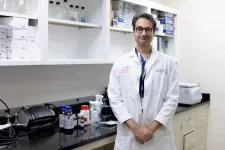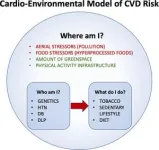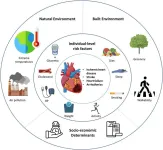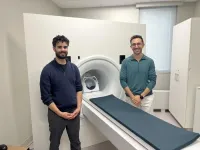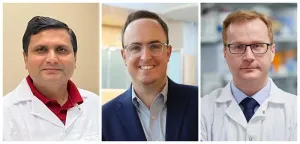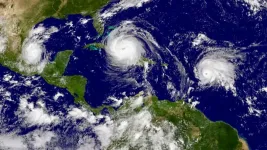(Press-News.org) Unruptured cerebral aneurysms of sizes and locations that require attention may be frequently missed in routine clinical care, but a machine learning algorithm could minimize missed care opportunities, according to a new study from UTHealth Houston.
The research, published today in Stroke: Vascular and Interventional Neurology, was led by senior author Sunil A. Sheth, MD, associate professor in the Department of Neurology with McGovern Medical School at UTHealth Houston, as well as co-first authors Hyun Woo Kim, MD, vascular and interventional neurology fellow at UTHealth Houston, and Anjan Nagesh Ballekere, MS, research coordinator in the neurology department.
Approximately 30,000 people living in the U.S. experience a ruptured aneurysm annually. The estimated prevalence of unruptured cerebral aneurysms is 3.2%. Currently, many of these aneurysms are found incidentally on brain imaging, performed often for unrelated reasons, and getting an accurate count remains challenging.
“We have already seen the tremendous benefit that machine learning can bring to patients suffering from acute stroke,” said Sheth, who is also director of the vascular neurology program at McGovern Medical School. “In this study, we see a similar possibility for substantially improving the way in which we identify, counsel, and help patients with brain aneurysms.”
The team studied a prospectively maintained registry that included eight certified stroke centers. They identified patients who underwent computed tomography (CT) angiography for evaluation of possible stroke from March 14, 2021, to Nov. 31, 2021. A machine learning algorithm called Viz Aneurysm analyzed imaging to identify unruptured brain aneurysms at least 4 millimeters in size.
Of the 1,191 CT angiograms performed during the study period, 50 were flagged by the machine learning algorithm as possibly demonstrating an unruptured cerebral aneurysm. Among those, 36 true aneurysms were identified from the 31 CT angiograms, with four cases of multiple aneurysms.
Twenty-four of the 36 aneurysms (67%) were previously not referred for follow-up, with a median size of 4.4 millimeters. Among them, five aneurysms measured greater than 7 millimeters and had an average risk of rupture of 2.4% over five years. In other words, only 33% of unruptured cerebral aneurysms – many of which require attention and may warrant treatment – were originally referred for follow-up in routine clinical care.
“Before Viz Aneurysm, the referral rate of unruptured cerebral aneurysms were significantly lower than we expected,” Kim said. “We believe that machine learning algorithm screening and alerting clinicians to studies that may harbor cerebral aneurysms could improve rates of detection and follow-ups.”
Overall, the most common locations of aneurysms included the internal carotid artery (46%).
The researchers said machine learning algorithms have the potential to improve the identification of unruptured cerebral aneurysms by flagging CT angiograms suspected of aneurysm, and coordinating the potential follow-up with referral and communication options for the entire care team in the same application.
“We hope to continue and improve upon this work in order to benefit patients,” Ballekere said. “This will help improve quality of care for acute stroke patients when implemented.”
Co-authors with McGovern Medical School included Iman Ali, third-year student; neurology residents Sergio Salazar Marioni, MD, and Arash Niktabe, MD; and neurology research coordinators Hussain Azeem and Ananya Iyyangar. Other UTHealth Houston co-authors included Rania Abdelkhaleq, MPH, third-year student at UTHealth Houston School of Public Health, and Luca Giancardo, PhD, associate professor of health data science and artificial intelligence with McWilliams School of Biomedical Informatics at UTHealth Houston. Also co-authoring the study were Omri Segev, BMedSc; Orin Bibas; and Christopher J. Love, PhD, with Viz.ai; and Dan Paz, MD, with Galilee Medical Center in Israel. Viz.ai sponsored the study in part.
END
UTHealth Houston study: Unruptured brain aneurysms may be missed in routine clinical care, but AI-powered algorithm can help
2023-09-13
ELSE PRESS RELEASES FROM THIS DATE:
Electrifying vehicles in Chicago would save lives, reduce pollution inequities
2023-09-13
If the Chicago region replaced 30% of all on-road combustion-engine vehicles — including motorcycles, passenger cars and trucks, buses, refuse trucks and short- and long-haul trucks — with electric versions, it would annually save more than 1,000 lives and over $10 billion, according to a new Northwestern University study.
The new study, which simulates air quality at a neighborhood scale, also found that areas with predominantly Black, Hispanic and Latinx residents would benefit most.
The study underscores the potential of electric vehicles (EVs) to improve ...
Noted experts present detailed evidence on the impact of environmental issues on cardiovascular health
2023-09-13
Philadelphia, September 13, 2023 – There is already robust evidence that people living with cardiovascular disease are disproportionately affected by poor air quality and extreme temperatures, in large part due to climate change, the greatest threat to human health of the 21st century. In this special theme issue of the Canadian Journal of Cardiology, published by Elsevier, noted experts comprehensively review how climate change occurs and increases the risk of cardiovascular disease and provide practical tips on how to become a climate-smart cardiovascular healthcare provider.
Not long ago, climate change was a fringe topic deemed only ...
Western researchers use AI to predict recovery after serious brain injury
2023-09-13
Two graduate students from Western University have developed a ground-breaking method for predicting which intensive care unit (ICU) patients will survive a severe brain injury.
Matthew Kolisnyk and Karnig Kazazian combined functional magnetic resonance imaging (fMRI) with state-of-the art machine learning techniques to tackle one of the most complex issues in critical care.
Whether it is the result of a stroke, cardiac arrest or traumatic brain injury, lives can forever be changed by a serious brain injury. When patients are admitted to the ICU, families are faced with tremendous uncertainty. Will my loved one recover? Are they aware of what is going on? Will they ever be the same ...
Flu: Interferon-gamma from T follicular helper cells is required to create lung-resident memory B cells
2023-09-13
BIRMINGHAM, Ala. – During a bout of influenza, B cells interact with other immune cells and then take different paths to defend the body. One path is the B cells that differentiate into antibody producing cells. Another path is the B cells that differentiate into lung-resident memory B cells, or lung-BRMs, that are critical for pulmonary immunity.
Unlike antibody-producing B cells that help fight the current infection, the long-lived, non-circulating lung-BRMs migrate to the lungs from draining lymph nodes. ...
Three University of Oklahoma faculty receive National Institutes of Health funding to maximize their research
2023-09-13
For the first time in one year, three faculty at the University of Oklahoma have received Maximizing Investigators’ Research Awards from the National Institutes of Health.
The recipients are Gallogly College of Engineering faculty Vivek Bajpai, Ph.D., John R. Clegg, Ph.D., and Stefan Wilhelm, Ph.D. The highly competitive five-year, $1,866,485 grants will support their ambitious research programs without the need to recompete for funding throughout the duration of their awards.
Bajpai, an assistant professor in the School of Sustainable Chemical, Biological and Materials Engineering, will lead the project, “Epigenetic and Transcriptional ...
UNIST, DGIST, and POSTECH consortium selected for 2023 ITRC Project in ‘Quantum ICT’ sector!
2023-09-13
The consortium, comprising of UNIST, DGIST, and POSTECH has been chosen for the esteemed 2023 University ICT Research Center Project (ITRC) by the Ministry of Science and ICT (MSIT). This prestigious selection recognizes their expertise in the ‘Quantum Information and Communication Technologies‘ sector. The consortium aims to develop advanced quantum technologies while nurturing exceptional master’s and doctorate-level talents. With a total funding amounting to 8.25 billion won—7.5 billion won from government subsidies—the project spans eight years.
The kick-off meeting held at UNIST on August ...
Human emmisions drive changes in north Atlantic ocean temperatures, west African rainfall, hurricanes
2023-09-13
A new climate study led by scientists at the University Miami Rosenstiel School of Marine, Atmospheric, and Earth Science found that temperature fluctuations in the tropical Atlantic Ocean temperature is largely driven by human-induced aerosol emissions, impacting rainfall in West Africa’s Sahel region and hurricane formation in the Atlantic.
The findings, published in the journal Nature, comes in a year when several hurricanes, including Hurricane Idalia, formed within days of each other over the tropical Atlantic.
“Our ...
WVU engineers study how to pull carbon out of building air to make methanol
2023-09-13
Researchers at West Virginia University have taken the first steps toward developing technology that can capture carbon dioxide in the air and use it for eco-friendly manufacturing of methanol. The process they have begun modeling — which involves pulling air from buildings — could increase the sustainable supply of methanol, one of the world’s most extensively used raw materials, while removing a planet-warming greenhouse gas from the atmosphere.
Project lead Xingbo Liu, who serves as professor, associate dean for research and chair of engineering ...
LSU Health New Orleans study identifies a potential new approach to PTSD treatment
2023-09-13
New Orleans, LA – An LSU Health New Orleans research study led by Siqiong June Liu, PhD, Professor of Cell Biology and Anatomy, has found that cerebellar inhibitory interneurons are essential for fear memory, a type of emotional memory formation. Inhibitory interneurons within the cerebellar circuitry act as gatekeepers and control the output of the cerebellar cortex. The formation of fear memory requires the activity of these interneurons. The findings, which ...
Scientists find good places to grow long-spined sea urchins, a starting point to restore ‘the lawn mowers of the reefs’
2023-09-13
Scientists call long-spined sea urchins “the lawn mowers of the reefs” because they eat algae that could otherwise smother reef ecosystems and kill corals.
That’s why researchers affiliated with the University of Florida Tropical Aquaculture Lab (TAL), who work at the Florida Aquarium’s Conservation Campus in Apollo Beach, are trying to raise as many urchins as possible.
Aaron Pilnick, a post-doctoral researcher at TAL, led newly published research that identifies substrates that help long-spined sea urchins – scientifically known as Diadema -- ...
